Experts predict that by 2026, vibe coding will revolutionize software development. You’ll see AI tools automating substantial portions of coding, enhancing efficiency and allowing you to focus on strategic tasks. As collaboration becomes essential, expect smaller teams skilled in AI and traditional tech. The job market will demand new roles like AI trainers, while ethical considerations will guide AI collaboration. If you keep exploring, you’ll uncover more insights on these exciting developments in coding.
Key Takeaways
- Vibe coding will become mainstream, with AI tools generating up to 95% of codebases for many startups by 2026.
- Developers will increasingly blend traditional skills with AI capabilities, fostering innovation and improving code quality.
- Specialized roles like AI trainers and prompt engineers will emerge, reflecting the need for continuous learning in the workforce.
- Enhanced collaboration among cross-functional teams will be essential, integrating AI, DevOps, and cybersecurity expertise for efficient software development.
- Ethical considerations, including algorithmic fairness and data privacy, will shape the landscape of vibe coding and AI integration.
The Rise of AI-Powered Tools in Software Development
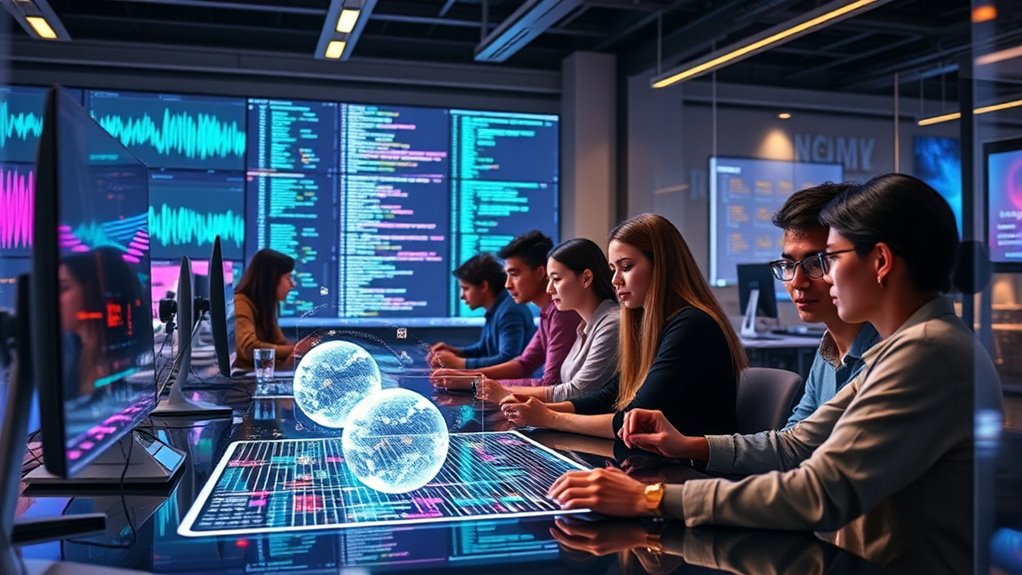
As AI technologies continue to evolve, you’re likely to see a significant transformation in software development through the rise of AI-powered tools.
These tools can boost efficiency, speeding up development by at least 25% and automating around 30% of coding tasks. With platforms like GitHub’s Copilot, you can generate and review code, quickly detecting bugs and errors. The AI-driven platforms are designed to cater to diverse preferences, which could further enhance coding efficiency. Moreover, predictive analytics can help developers anticipate potential coding challenges, streamlining the development process. Additionally, advancements in quantum computing are expected to further accelerate data processing capabilities, enabling even more complex software solutions. This evolution mirrors the growing trend of AI in marketing, where data-driven strategies are reshaping how businesses operate.
AI-powered tools enhance efficiency, accelerating development by 25% and automating 30% of coding tasks, streamlining the coding process.
This integration of human creativity with AI leads to faster innovation and higher-quality software. The AI market is rapidly expanding, projected to grow from $196 billion in 2023 to $1.8 trillion by 2030.
To keep pace, tech leaders are offering courses to equip developers with essential skills for this AI-driven landscape, ensuring you’re prepared for the future of coding. Moreover, the use of automation in business intelligence will further enhance the capabilities of these tools, allowing for real-time insights and improved decision-making.
Embracing Conversational Development Techniques
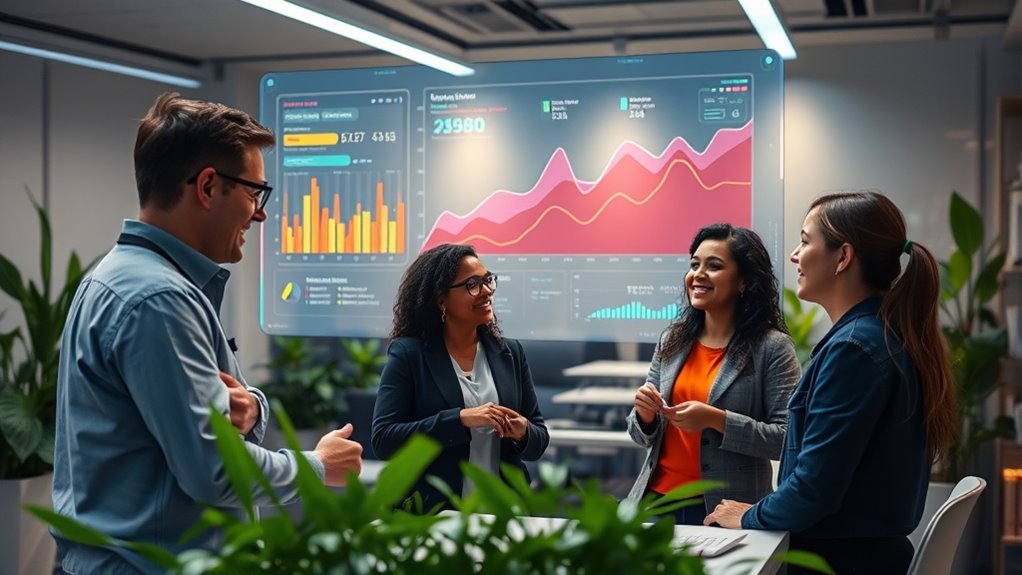
While traditional programming often relies on strict syntax and structured commands, embracing conversational development techniques transforms the way you interact with AI tools. By using natural language, you enhance collaboration with AI, allowing it to convert your instructions into executable code seamlessly. This shift lets you focus on creativity and high-level problem-solving, rather than getting bogged down in syntax. Multi-turn dialogues enable more coherent interactions, while smaller teams can expedite software development processes. As English becomes the primary programming language thanks to AI, you’ll find that adaptability and effective communication are essential. Ultimately, these techniques not only simplify coding but also foster an inclusive environment where innovation thrives, making the development process more efficient and enjoyable. Additionally, leveraging insights from astrological compatibility can enhance team dynamics and collaboration, further boosting productivity in development teams. Furthermore, the integration of natural language processing enables smoother interactions, allowing developers to communicate ideas more effectively with AI tools.
Anticipated Productivity Gains From AI Integration

Integrating AI into your workflows can considerably boost productivity, especially as organizations increasingly harness its capabilities. IDC predicts $1 trillion in global productivity gains by 2026 through GenAI integration. By 2025, 35% of enterprises could double their revenue growth using GenAI-powered skills development.
AI excels at automating routine tasks and analyzing data in real-time, providing actionable insights for process improvements. This leads to enhanced work quality and fewer mistakes. Moreover, the market growth projected for AI tech is over 40% CAGR by 2025, indicating a rapidly advancing landscape. The increasing reliance on programmatic advertising highlights how AI is reshaping various industries, including marketing. For instance, companies might leverage protein-rich meals like the Egg Rollup and Dumpling Sauce to boost energy levels and maintain productivity throughout the day. Incorporating leafy greens into your diet can also support cognitive function, which is essential for maximizing productivity in AI-driven environments.
AI automates routine tasks and analyzes data in real-time, driving process improvements, enhanced work quality, and reduced errors.
In addition, AI tools streamline project management, enabling better team coordination. As you adopt AI, you’ll likely experience significant efficiency improvements, cost reductions, and a competitive edge, positioning your organization for success in a rapidly changing landscape. Furthermore, AI-driven personalized learning experiences can empower employees through tailored skill development and training opportunities.
Get ready to embrace these transformative gains!
Navigating Job Market Changes Due to AI

The integration of AI into workflows not only boosts productivity but also considerably reshapes the job market. You might notice a significant shift, as AI could displace around 85 million jobs by 2025, while creating 97 million new roles. Sectors like retail and low-paid service work are feeling the pinch, yet most jobs will be complemented rather than replaced by AI. Historically, every tech revolution has birthed new roles, and this time is no different. Positions such as AI trainers and prompt engineers are emerging, requiring you to adapt and focus on specialized skills. Continuous learning will be essential as the workforce needs to align with AI capabilities, ensuring you’re prepared for these changes in the evolving job landscape. Understanding cultural intelligence will be crucial for navigating the complexities of new roles in a diverse, AI-driven job market. As we embrace this transformation, iterative processes will play a key role in refining skill sets and enhancing adaptability. Moreover, developing a strong entrepreneurial mindset will enable individuals to take calculated risks and innovate within the new job framework. Additionally, industries like automotive tuning, including BMW tuning, will require skilled professionals who can work with advanced technology and performance modifications. Given the rapid advancement of technology, sectors such as hearing health will also see a demand for specialized roles related to audiometric testing.
Essential New Skills for Future Developers
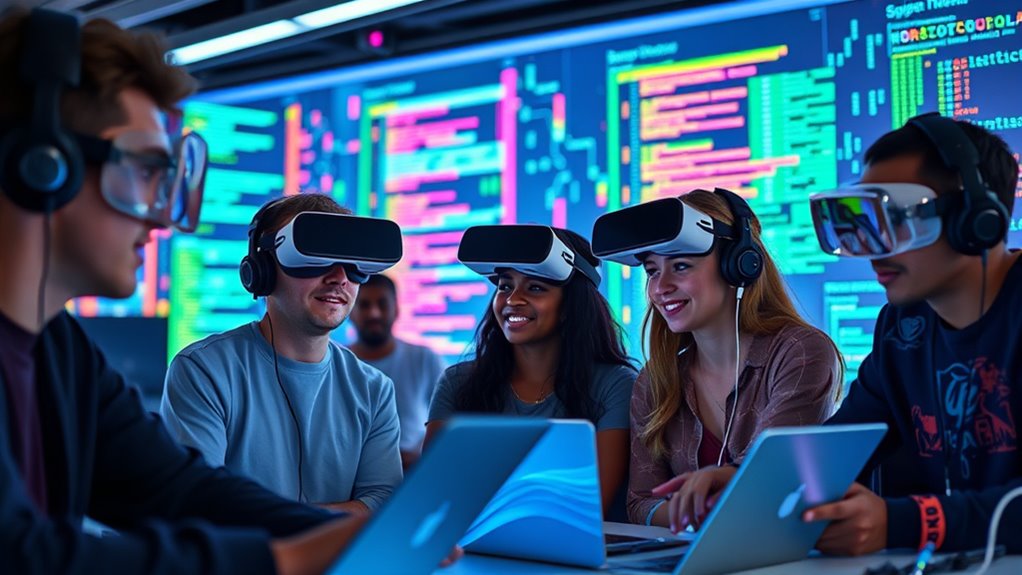
As technology evolves, you’ll need to equip yourself with essential new skills that embrace the future of software development.
Adaptability to AI tools is important, as generative AI, like ChatGPT, is reshaping the industry. You’ll need to master critical thinking and agile problem-solving, enabling you to tackle complex challenges effectively. Incorporating nutrient-dense snacks like chia seed energy bars can enhance your focus and productivity during long coding sessions.
Embrace adaptability to AI tools and enhance your critical thinking for effective problem-solving in a rapidly evolving industry.
Digital literacy, particularly in understanding AI ethics and cybersecurity, is essential for responsible development. Strong communication and collaboration skills are necessary for working with both AI tools and team members.
Finally, specialized technical skills in areas like machine learning and cloud computing will set you apart. Embrace continuous learning to stay ahead in this rapidly changing landscape, integrating AI insights into your decision-making. Additionally, understanding solar energy systems can enhance your ability to create sustainable tech solutions in the future.
The Mainstream Adoption of Vibe Coding
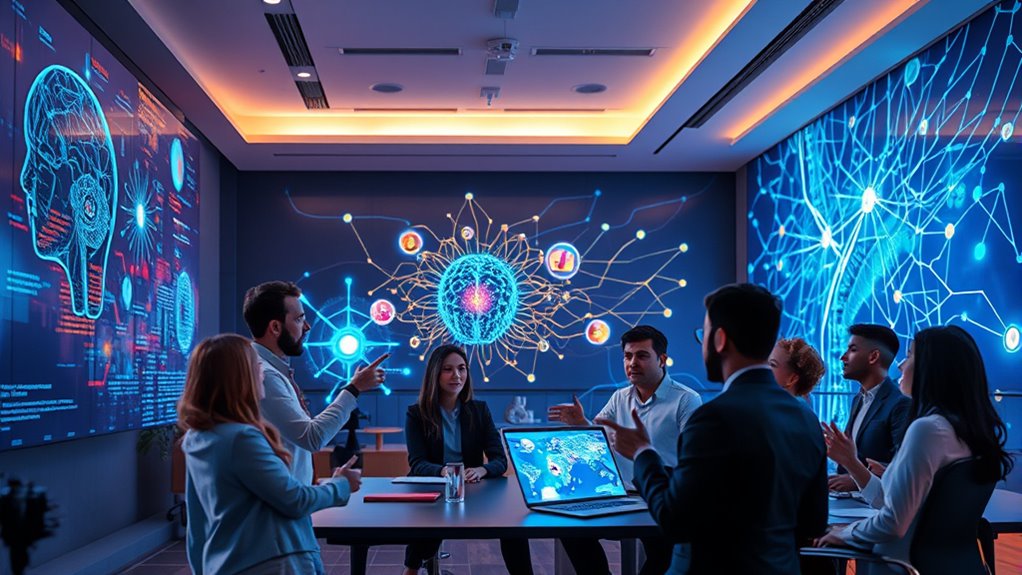
While traditional programming methods still hold value, vibe coding is rapidly becoming the go-to approach for many developers and startups.
With about one-quarter of Y Combinator startups relying on AI to generate up to 95% of their codebase, it’s clear that the trend is gaining momentum. Major platforms like GitHub Copilot and OpenAI’s ChatGPT are making this shift easier, allowing solo creators to build projects in hours. This integration of AI empowers both experienced developers and newcomers, democratizing coding and fostering rapid innovation. Additionally, AI-dependent programming techniques are enabling a more intuitive way to solve complex problems and create solutions. As AI security measures become increasingly vital, developers must remain vigilant about potential vulnerabilities and biases in AI-generated outputs. Moreover, cybersecurity vulnerabilities can be exacerbated during outages, highlighting the importance of robust contingency plans for developers. Furthermore, quality assurance will play a crucial role in ensuring that AI-generated code meets industry standards and performs reliably. To navigate this evolving landscape, developers must also embrace diversifying income streams to adapt to new opportunities and challenges.
However, concerns about security and performance persist, especially among those lacking fundamental coding knowledge. Balancing AI tools with traditional skills and ensuring thorough testing will be essential as vibe coding becomes mainstream.
Economic Impact of AI Efficiency in the UK

Vibe coding’s rise isn’t just transforming how developers create; it’s also driving significant economic changes in the UK. By 2030, AI’s efficiency could boost the GDP by up to 10.3%, adding around £232 billion. This growth stems from enhanced product quality and an increase in personalized goods, projected to contribute 4.5% and 3.7% to GDP, respectively. Furthermore, AI augments productivity, allowing businesses to optimize processes and innovate. As current trends in private equity markets continue to evolve, investors will increasingly seek opportunities in AI-driven sectors. Additionally, the push for Gold IRA options in retirement planning reflects a broader trend of diversifying investment portfolios as individuals prepare for economic shifts. As you invest in AI and cloud technologies, expect impressive returns—over 5:1 in the next decade. Emphasizing digital skills will be essential, as adapting to these changes can enable vast economic opportunities while ensuring a dynamic job market evolves alongside automation.
Ethical Considerations in AI Collaboration

When considering the future of AI collaboration, it’s important to address the ethical challenges that arise. You need to guarantee algorithmic fairness so AI systems don’t introduce bias.
It’s also significant to obtain informed consent, letting users know how AI will be used in projects. Open dialogue with the public fosters trust and addresses concerns.
Strong privacy protocols must protect data, while transparency in AI decision-making is critical. Incorporating human oversight and co-supervision into AI systems helps maintain ethical decision-making.
Establishing accountability structures guarantees responsible parties are held accountable. By designing AI with ethical considerations in mind, you can promote collective responsibility among humans and AI, paving the way for more responsible and ethical collaborations.
The Evolution of Developer Roles and Responsibilities
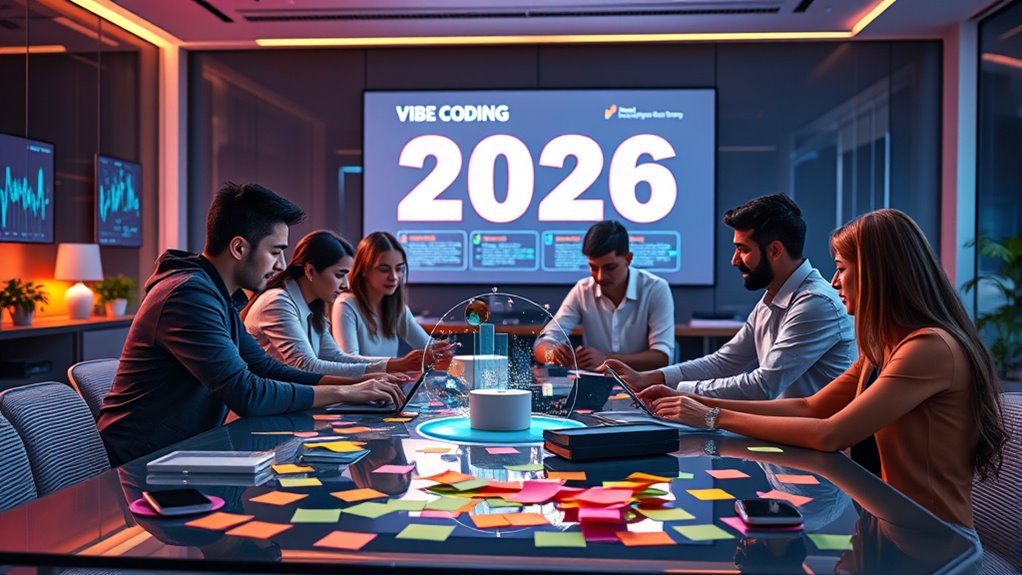
As automation reshapes the software development landscape, developers are finding their roles evolving beyond traditional coding tasks.
With AI-driven tools automating routine coding, you’ll focus more on strategic responsibilities like architectural design and problem-solving. Your skill set will need to expand, emphasizing advanced AI knowledge and effective prompt engineering, while still grasping programming fundamentals.
Collaboration will be key, as you work alongside cross-functional teams, integrating AI and DevOps expertise. Smaller, more efficient teams will emerge, enhancing productivity and driving innovation.
Furthermore, roles specializing in AI, cybersecurity, and ethical considerations will become essential. Embracing continuous learning will be crucial as you navigate these shifts and align projects with business objectives.
Future Innovations: Verticalized Apps and Automated Processes

With the evolution of developer roles, the focus is shifting toward innovations that enhance efficiency and productivity.
Verticalized apps are gaining traction, as 89% of executives in 2023 recognized vertical SaaS as the future. These industry-specific solutions streamline workflows, integrating modular functionalities and specialized data handling to improve user experience.
By incorporating AI, verticalized apps drive automation, reducing manual tasks and enabling smarter decision-making. This trend not only simplifies complex operations but also fosters continuous innovation, vital for staying competitive.
As businesses adapt quickly to changing needs, adopting verticalized apps and automated processes will give you the edge to enhance productivity and operational effectiveness in your industry.
Embracing these innovations is essential for future success.
Frequently Asked Questions
How Will Vibe Coding Affect Traditional Coding Education Programs?
Vibe coding’s impact on traditional coding education programs is significant.
You’ll notice a shift towards creative problem-solving over just technical skills. As vibe coding simplifies learning, it opens doors for diverse learners, allowing more people to participate.
You’ll find a hybrid approach emerging, blending traditional methods with AI tools. This balance helps you maintain essential coding skills while fostering creativity, ensuring you’re well-prepared for the evolving tech landscape.
What Industries Are Most Likely to Adopt Vibe Coding First?
You might think traditional industries would hesitate to adopt vibe coding, but that’s not the case.
Software development and data analytics are leading the charge, leveraging AI to streamline processes.
Healthcare’s also embracing it for secure patient data management, while education benefits from enhanced learning tools.
Financial services, with their regulatory demands, find AI-generated code appealing for compliance and security.
These sectors show a clear trend towards rapid vibe coding integration.
How Can Companies Ensure Ethical AI Use in Vibe Coding?
To guarantee ethical AI use in vibe coding, you need to establish clear industry standards and governance frameworks.
Promote transparency in your AI processes and continuously monitor for biases.
Provide training for your developers on ethical considerations, and implement robust audit processes for accountability.
Foster human-AI collaboration and encourage best practice sharing among your teams.
What Role Will Community Feedback Play in Vibe Coding Development?
Community feedback plays an essential role in vibe coding development. It helps you adopt tools faster, shapes feature enhancements, and reduces errors in generated code.
By sharing insights, you contribute to creating standards and guidelines, ensuring a collaborative learning environment. Your input drives innovation, customizes AI models, and improves accessibility for diverse users.
Engaging with the community not only enriches your own experience but also elevates the overall quality of vibe coding tools.
Will Vibe Coding Influence the Freelance Job Market for Developers?
Did you know that 80% of coding tasks could be automated by AI in the next few years?
Vibe coding will definitely influence the freelance job market for developers. As routine tasks get automated, you might find demand shifting toward specialized roles.
You’ll need to adapt by honing skills like AI integration and critical thinking. Embracing these changes could open up new opportunities, allowing you to thrive in an evolving landscape.
Conclusion
As we look ahead to 2026, the world of vibe coding is set to explode with innovation and opportunity. Embracing AI-powered tools and conversational development will not only enhance productivity but also redefine what it means to be a developer. You’ll need to adapt to new skills and navigate the changing job market, but the rewards will be monumental. By staying ahead of these trends, you’ll be at the forefront of a coding revolution that could change everything.









